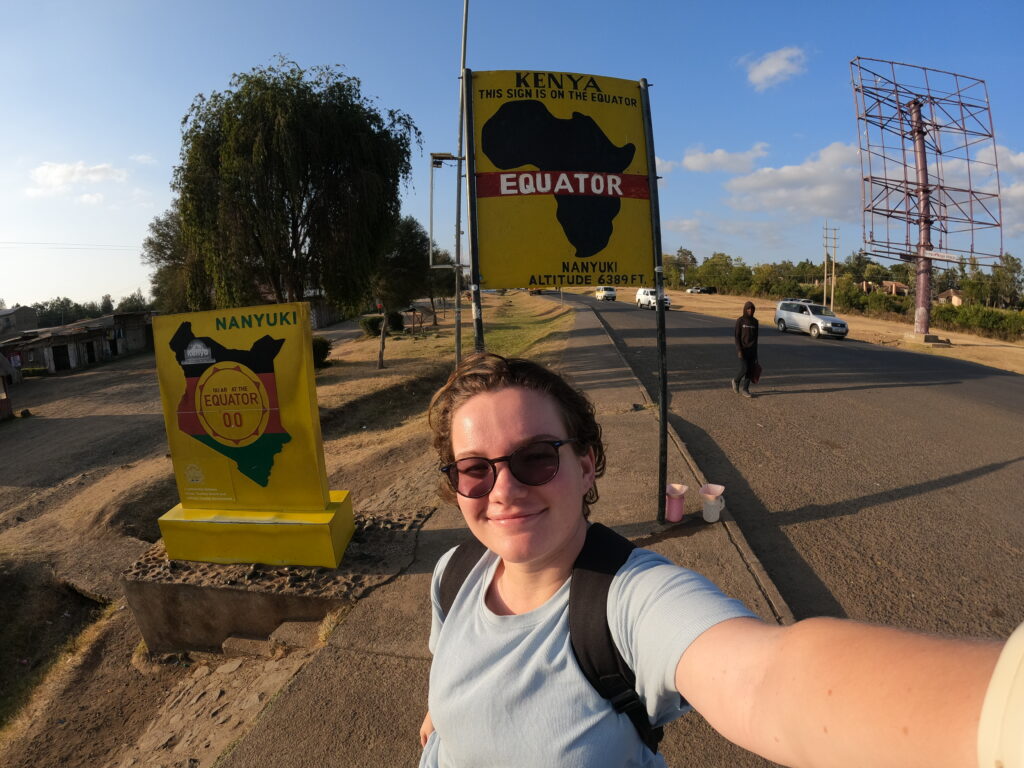Kenya, a land of breathtaking landscapes, rich cultural heritage, and abundant wildlife, is a dream destination for many travelers. Whether you’re visiting the Maasai Mara for a safari, relaxing on the pristine beaches of Diani, or exploring the bustling streets of Nairobi, traveling to Kenya doesn’t have to break the bank. With the right strategies, you can enjoy this East African gem without overspending. Here are nine affordable travel tips for Kenya to help you make the most of your trip.

I visited Nanyuki in 2023, behind me you can see the Equator sign.
Table of Contents
1. Travel Tips for Kenya: Plan Your Trip During the Low Season
Kenya’s travel seasons significantly affect costs. The high season, from July to October and during the December holidays, often comes with higher prices for accommodation, tours, and flights due to the influx of tourists. However, visiting during the low season—from March to June and November—can save you a lot of money.
During the low season:
- Accommodation is cheaper: Many hotels, lodges, and Airbnb hosts offer discounts to attract visitors.
- Safari deals are available: Tour operators often lower their prices, and parks are less crowded, allowing for a more intimate wildlife experience.
- Flights are more affordable: Airlines frequently reduce ticket prices during off-peak months.
Moreover, Kenya’s scenery is stunning year-round, and the low season offers unique perks, such as lush green landscapes and fewer crowds at popular attractions.

If you want to take the train, I recommend to book it far in advance, especially during the high-season. We tried taking it during the end of November and it was fully booked for more than a week ahead.
2. Travel Tips for Kenya: Choose Budget-Friendly Accommodation
Accommodation can be one of the most significant expenses when traveling. Fortunately, Kenya offers a wide range of budget-friendly options without compromising comfort or safety. Here are some affordable choices:
- Hostels and Guesthouses: Cities like Nairobi and Mombasa have many hostels and guesthouses starting from $10 per night. These are ideal for solo travelers or those looking to meet other budget-conscious adventurers.
- Camping: For nature lovers, camping in national parks or designated campsites is an economical option. Many parks provide affordable camping facilities, allowing you to immerse yourself in Kenya’s wild beauty.
- Airbnb: Renting an Airbnb is a cost-effective alternative, especially for families or groups. Options range from private rooms to entire apartments or houses.
- Local Hotels: In smaller towns, locally-run hotels are often inexpensive and offer a more authentic Kenyan experience.
When booking, use platforms like Booking.com or Hostelworld to compare prices and read reviews to ensure quality.
I’ve stayed in a few different places, and come to the conclusion that shared apartments are the most ideal. You have a bigger space, at a lower price, and it is usually in the best areas. For example, my first time in Nairobi was spent in a shared apartment in Westlands. I am currently in a shared apartment in Nyali, Mombasa – writing this article for you guys. Will add links to the apartment in the future…
3. Travel Tips for Kenya: Travel Like a Local
Transportation costs can add up quickly, but by using local transport options, you can save a significant amount of money.
Public Transport Options:
- Matatus: These colorful minibusses are the backbone of Kenya’s public transport system. They’re affordable, costing as little as $0.50 for short distances within cities. While they might seem chaotic at first, they’re an authentic way to experience local life.
- Buses: For longer distances, buses are a reliable and cheap option. Companies like Easy Coach and Modern Coast offer routes across Kenya with fares starting at $5.
- Boda-Bodas: Motorcycle taxis, known as boda-bodas, are great for short trips in towns or rural areas. Always negotiate the fare before hopping on.
Pro Tips:
- Avoid private taxis as they can be expensive. Instead, use ride-hailing apps like Bolt or Uber in major cities for fair prices.
- For safaris, consider joining group tours or sharing transportation costs with other travelers.

When I want a car, I always use Uber. Otherwise, I prefer a boda-boda. They are fast and effective during peak-traffic-hours.
4. Travel Tips for Kenya: Eat Local and Save Big
Food is an essential part of any travel experience, and in Kenya, eating like a local can save you money while introducing you to delicious cuisine.
Budget-Friendly Dining Options:
- Street Food: Kenya’s street food is both affordable and flavorful. Try dishes like samosas, chapati, or mutura (a Kenyan sausage) for as little as $1.
- Local Restaurants (‘Mama Ntilie’): These small, family-run eateries serve hearty Kenyan meals like ugali (maize flour porridge) with sukuma wiki (collard greens) and nyama choma (grilled meat) at pocket-friendly prices.
- Markets: Visit local markets to buy fresh fruits, vegetables, and snacks. They’re inexpensive and perfect for preparing your own meals if you’re staying in self-catering accommodation.
Dining Tips:
- Drink tap water only if it’s been boiled or purified. Bottled water is widely available and costs less than $1.
- Avoid international fast food chains, as they’re often more expensive than local eateries.

Chapati is my favourite food to buy from street vendors. Currently paying between 20-25 KES per chapati.
5. Travel Tips for Kenya: Explore Free or Low-Cost Activities
Kenya offers countless experiences that don’t require a hefty budget. From nature hikes to cultural tours, you’ll find many ways to explore the country affordably.
Free or Affordable Attractions:
- National Parks and Reserves: While safaris can be pricey, some parks, like Nairobi National Park, offer affordable entry fees (approximately $43 for non-residents). Consider self-driving if you’re confident navigating the terrain.
- Beaches: Kenya’s coastline is home to stunning beaches like Nyali, Diani, and Watamu. Access is free, and you can enjoy activities like swimming, snorkeling, or simply relaxing.
- Hiking: Explore Kenya’s diverse landscapes on foot. Karura Forest in Nairobi, Ngong Hills, and Hell’s Gate National Park are popular spots with low entrance fees.
- Cultural Experiences: Visit local markets, art galleries, or villages to learn about Kenyan traditions and crafts. Many cultural centers charge minimal fees for tours.
- Walking Tours: In cities like Nairobi or Mombasa, free or donation-based walking tours are available, led by knowledgeable guides who share the history and culture of the area.
Budget Tip:
Always check if there are discounts for students or group bookings when visiting attractions.
6. Travel Tips for Kenya: Book Flights Early and Search for Deals
Flights to Kenya can be a significant expense, but booking early and being flexible with your travel dates can help you save big.
Tips for Affordable Flights:
- Use flight comparison websites like Skyscanner or Google Flights to find the best deals.
- Set up fare alerts to track price drops.
- Fly into smaller airports like Mombasa or Kisumu if they’re cheaper than Nairobi.
- Consider layovers: Flights with layovers are often more affordable than direct flights.
Planning well in advance and being strategic with your bookings can help reduce travel costs significantly.
7. Travel Tips for Kenya: Pack Smart to Avoid Extra Costs
Packing wisely can save you from unexpected expenses during your trip. Overpacking can lead to additional baggage fees, while forgetting essentials might force you to buy overpriced items.
Packing Tips:
- Bring versatile clothing suitable for Kenya’s climate, such as light layers and sturdy shoes.
- Pack a reusable water bottle to save money and reduce plastic waste.
- Carry a small first-aid kit to avoid spending on minor medical needs.
- Don’t forget adapters for Kenya’s electrical outlets (Type G).
By packing thoughtfully, you’ll avoid unnecessary purchases and focus on enjoying your trip.
8. Travel Tips for Kenya: Learn Basic Swahili Phrases
Learning a few Swahili phrases can go a long way in enhancing your travel experience and saving money. Locals appreciate the effort and might be more willing to give you fair prices when bargaining.
Useful Phrases:
- Jambo (Hello)
- Asante (Thank you)
- Pesa ngapi? (How much?)
- Ninaomba punguzo (Can I have a discount?)
Engaging with locals in their language creates a friendly rapport and can lead to better deals.
9. Travel Tips for Kenya: Travel in Groups to Split Costs
Traveling with friends or joining group tours can make your Kenyan adventure more affordable. Many expenses, such as accommodation, transportation, and safari tours, are cheaper when shared among several people.
Group Travel Perks:
- Discounts on guided tours.
- Shared accommodation costs for larger Airbnb rentals or family rooms.
- Reduced transport fees when hiring private vans or safari vehicles.
If you’re traveling solo, consider connecting with other travelers through platforms like Couchsurfing or travel forums to form groups.
By following these nine tips, you can experience the beauty and culture of Kenya without overspending. Start planning your trip today and enjoy everything this vibrant country has to offer without straining your wallet.
BONUS TIP: get a Safaricom simcard and ask them to activate MPESA. It is a Kenyan wallet that everyone uses to pay with. Very convenient and you never have to carry cash or wait for change. I will write an article about this in the future.
If you liked this article, you can find similar here:
https://blumulberry.com/category/travel
Sources:
https://www.railjournal.com/news/kenya-sgr-electrification-contract-signed/
https://swahilivillage.wordpress.com/2013/01/09/chapati-a-favorite-bread-for-every-meal/
